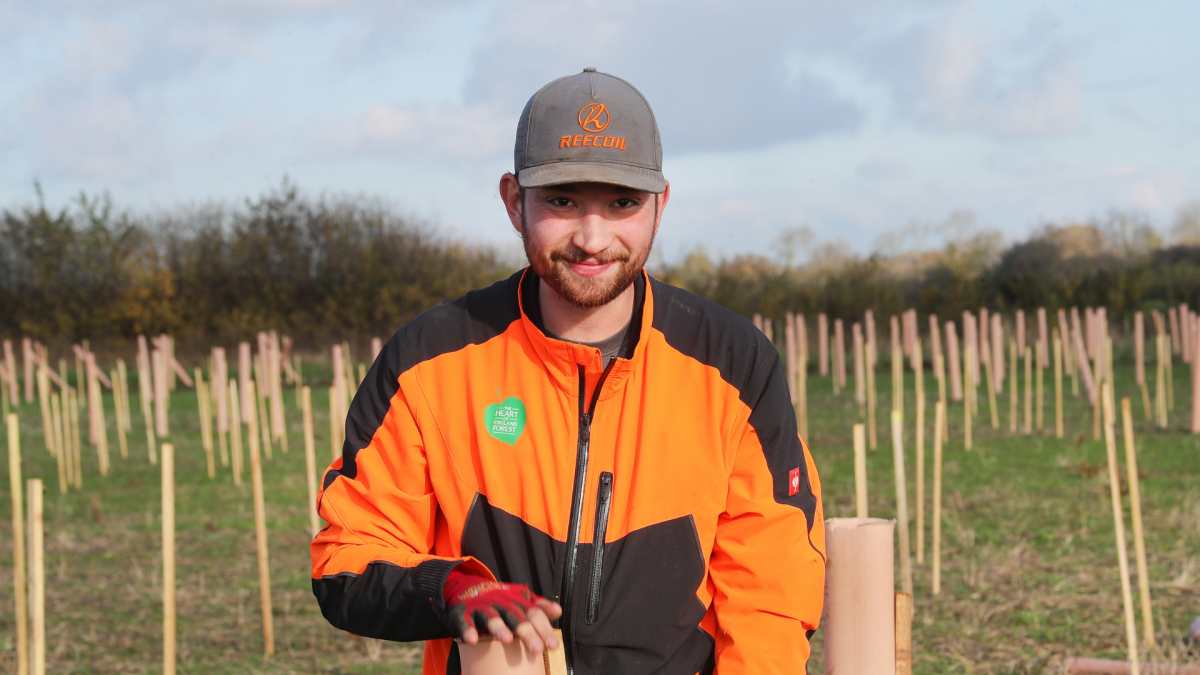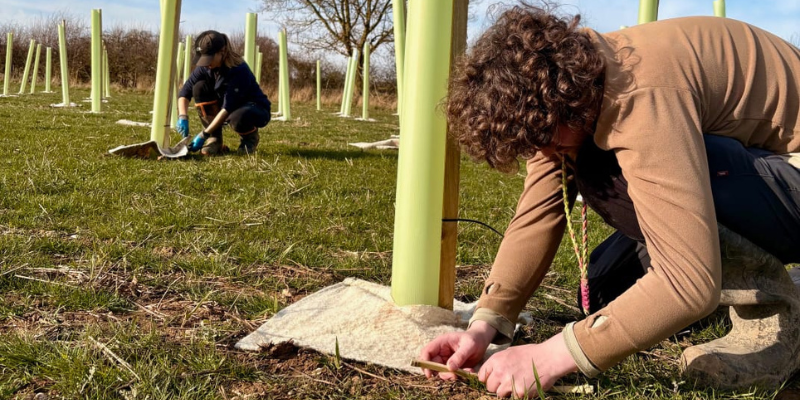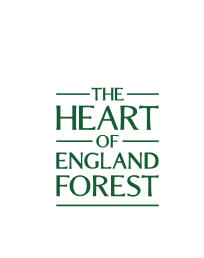
A new chapter in woodland creation
This year’s planting season has been a remarkable one, with 80,342 new trees planted establishing 50 hectares of vibrant new woodland – another step taken on our journey to grow and protect a vast broadleaf forest for generations to come.
From ancient landscapes like Parkfield Farm to the rolling fields of Naunton Beauchamp, the Forest is expanding, thriving, and evolving thanks to the passion and hard work of our dedicated forestry team, volunteers, and community supporters. But this isn’t just about numbers – it’s about restoring ecosystems, creating habitat for wildlife, and reconnecting people with nature in meaningful, lasting ways.
New woodland creation 2024/2025
An amazing 80,342 trees were planted this season, creating 50 hectares (120 acres) of new woodland between November 2024 and March 2025.
40,046 trees were planted at Naunton Beauchamp, 26,496 were planted at Parkfield Farm, and 13,800 were planted to replace any dead trees in sites across the Forest planted in previous years, so we have the right number of species on these sites.
A huge thanks to the forestry team for all their hard work and dedication throughout the winter season.
What species have we planted?
In the Forest, we plant a mix of up to 30 different species of native trees and shrubs, as well as some naturalised broadleaved trees which are commonly found in the British landscape, to create climate change resilient woodlands.
At Parkfield Farm, we have planted a mix of 20 species of broadleaf trees. A mix of native UK Species has been carefully selected that will thrive in the Parkfield soil, including:
| Bird Cherry | Prunus padus |
| Common Alder | Alnus glutinosa |
| Crab Apple | Malus sylvestris |
| Dog Wood | Cornus sanguinea |
| Field Maple | Acer campestre |
| Goat Willow | Salix caprea |
| Hazel | Corylus avellana |
| Hornbeam | Carpinus betulas |
| Osier Willow | Salix viminalis |
| Pendunculate Oak | Quercus robur |
| Purging Buckthorn | Rhamnus cathartica |
| Rowan | Sorbus aucuparia |
| Silver Birch | Betula pendula |
| Small Leaved Lime | Tilia cordata |
| Spindle | Euonymus europaeus |
| Sycamore | Acer pseudoplatanus |
| White Willow | Salix alba |
| Wild Cherry | Prunus avium |
| Wild Pear | Pyrus communis |
| Wild Privet | Ligustrum vulgare |
This season, 33% of the trees were sourced from our very own tree nursery, including oak, maple, hazel and rowan, a great achievement thanks to the hard work of staff and volunteers.
Our tree mix offers plenty of variety for wildlife as it grows, helping to recreate a native British woodland. While the land at Parkfield would once have been part of the Forest of Arden, the woodland has been gone for centuries, so it is exciting to once more return this site to woodland.
Trialling something new in the Forest
At Parkfield Farm, the planting looked a little different, with Rhizocore pellets being planted alongside the saplings - the mycorrhizal fungi within these pellets will enhance the trees' ability to absorb water and nutrients, helping to improve their growth rate and resilience to drought, and every tree has been mulch-matted.

Who has helped?
Over the past two months, volunteers have dedicated an incredible 1,587 hours to this planting season. We deeply appreciate the time and effort that has gone into creating this beautiful new woodland.
We've also had the pleasure of welcoming groups of young people, including students from local schools and our very own Young and Mini Foresters teams. It’s been wonderful to see them getting involved!
Our planting efforts have been further supported by teams of volunteers from our corporate partners, whose contributions have been invaluable. Our corporate partners are extremely valued and continue to support the charity’s mission.
Winter Forest management is carried out
Although tree planting dominates the winter season, managing the Forest is as important as creating it, so various management work was also completed, including selective thinning, coppicing, hedgerow laying, and footpath maintenance.
You can find out more about our winter woodland management here.
How does this work benefit you?
Our objective at the Heart of England Forest is to create and conserve a huge broadleaf forest for the benefit of the environment, wildlife, and people, here to enjoy now and in the future.
The Forest currently covers 7,000 acres with 58 miles of public and permissive footpaths for people to explore the woodlands and spend time in nature. But we need your help to maintain it.



